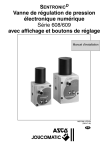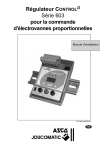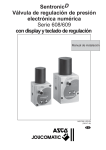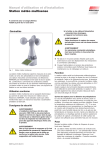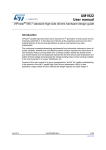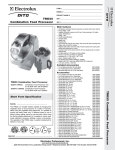Download Meyer Sound M-5 User's Manual
Transcript
M-5 Control Electronics Unit The Meyer Sound M-5 is an active signal processor designed for use with the MSL-5 loudspeaker. It is a single channel device, and it occupies a single 13⁄4-inch rack space. The functions of the M-5 are: Operating Instructions PUSH + + + - - - - GND Input 1 Input Active crossover for biamplification. 90-250 VAC 50-60 Hz 100mA MAX 90-105 105-125 AC Voltage Ranges Lo Sense Hi Sense 2 Lo Out Hi Out 210 - 250 180 - 210 105 - 125 90 - 105 210-250 180-210 AC Voltage 1/4 A SloBlo 4 3 (Red) • CAUTION: Set voltage before applying power. + Lift (Black) PUSH • Loudspeaker frequency response and phase response alignment. Hi Amplifier: Type 3 Amplifier with 16 dB fixed voltage gain. Hi Input Hi Output – • MultiSense™ driver protection. + Hi Sense Cable PUSH Lo Amplifier: Type 3 Amplifier with 16 dB fixed voltage gain. Lo Input Lo Output – + Lo Sense Cable Out to MSL-5 Diagram A: Connections for use with MSL-5 Connections The M-5 operates at line level and is designed to be the last component in the signal chain before the power amplifiers. Connections to the M-5 should be made according to Diagram A. 1. Signal Inputs to the M-5 should be balanced. For the best signal-to-noise ratio, the average input level should be at least 1 volt RMS. The M-5 will accept peak inputs of up to +26 dBV. Note: The M-5 utilizes Meyer Sound’s exclusive ISO™ Input. Pins 1, 2 and 3 are transformer-isolated, and the connector shell is connected to earth ground (pin 3 positive for positive pressure out from the MSL-5). 2. MultiSense™ connections are made from the outputs of the power amplifiers to the M-5 Sense inputs. The output(s) of the High power amplifier(s) must be connected to the Hi Sense inputs, and the Meyer Sound Laboratories, Inc. 2832 San Pablo Avenue Berkeley, CA 94702 output(s) of the Low power amplifier(s) to the Lo Sense inputs in order for the MultiSense driver protection circuitry to operate properly. Note: These inputs are polarity-sensitive: be certain that they are connected as indicated on the M-5 rear panel. 3. The signal Outputs from the M-5 are active balanced. The maximum output level before clipping is +26 dBV. 4. Connections between the power amplifier outputs and the MSL-5 loudspeaker should be made according to the MSL-5 Operating Instructions. These connections must be verified for correct polarity, and correct amplifier assignments (high to high, low to low). Color codes given in the diagrams are those used for Meyer Sound cables and adapters. M-5 Control Electronics Unit Operation Operating Instructions Once all the connections have been made and verified, the system is ready to operate. Note: Check the voltage selector switch located on the rear panel of the M-5 and verify that it is set to the range that corresponds to the mains AC voltage. Front Panel Controls • The M-5 Attn control should be set at minimum. • Switch on AC to the M-5 first, then to the power amplifiers. The setup controls on the M-5 front panel are designed to be used to tailor the system response for particular applications. Safe/Autosafe Switch. The M-5 incorporates three limiters in the MultiSense™ driver protection circuitry (see detailed description below). When the switch is in the Safe position, the RMS limiters come on at 6 dB lower power levels, affording added protection when heavy continuous power demands are placed on the system. For operator convenience, a green LED MultiSense™ Driver Protection • Verify that the power amplifier voltage gains are fixed at +16 dB (6.3 volts out for 1 volt in, measured from balanced input to speaker output terminals). • Advance the M-5 Attn control to set the system sensitivity. If the system is not operating properly, recheck all connections. Note: The Attn control markings are merely a visual aid and should not be used to balance two systems. The output of the M-5 is calibrated only when the level control is fully clockwise. indicator is provided on the M-5 front panel which lights when the M-5 is in the Safe mode. When the switch is in the Autosafe position, the M-5 monitors system power over time and automatically switches into Safe mode if the power demands become too high. In the case that Autosafe switches the M-5 into Safe mode, the green LED will light to indicate the change. Note: It is recommended that the switch be in the Safe position until the operator is familiar with the system’s capablities. Through the Sense connections between the M-5 and the power amplifiers, the MultiSense circuitry of the M5 continuously monitors the voltages across the high and low frequency drivers. If the amplifier output exceeds the safe operating limits of the drivers, independent limiters are automatically activated, holding down the level of the M-5 output. • Sense indicators. These function as signal presence indicators and verify that the Sense connections back to the M-5 are made. These indicators will be lit green whenever signal is present, or will flicker at low signal levels. These indicators will also light red if there is a sense fault (amplifier gain not set at +16 dB or sense lines improperly or not connected). Note: The M-5 employs an excursion limiting system which assumes a fixed amplifier voltage gain of +16 dB (6.3 volts out for 1 volt in). Please refer to the MSL-5 Operating Instructions or the Meyer Sound MSL-10A Power Amplifier Criteria note for a detailed description of MSL-5 / M-5 amplifier requirements. • Limit indicators. These indicators will come on whenever the corresponding limiter is activated, and a moderate amount of flashing of these indicators is acceptable. The Hi and Lo limiters have an attack time of 100 msec., so they will not affect peaks in the program material, nor will they prevent momentary amplifier clipping on peaks. • Supply an input to the M-5, preferably a sine wave oscillator. If you do not have an oscillator, use a microphone and a mixer to produce a line level signal. • Set the input frequency according to this table: The operation of the MultiSense circuitry is indicated by a set of five LEDs located on the front panel. Limiter Operation To verify limiter operation in the field: • • Disconnect loudspeakers, leaving the amplifier and the M-5 in their standard connection configuration. If your amplifier requires a load, use resistive loads sufficient to dissipate the full power of the amplifier. • Turn on both the M-5 and the amplifier. • Set the Safe switch in. Meyer Sound Laboratories, Inc. 2832 San Pablo Avenue Berkeley, CA 94702 Lo limiter Hi limiter • Oscillator 200 Hz 5,000 Hz Microphone low growl loud whistle Bring up the input until you see the corresponding limit indicator come on. Since in each case the indicator will light only if the limiter actually operates, it provides a positive indication that the limiter is functioning. M-5 Control Electronics Unit Operating Instructions Meyer Sound Laboratories, Inc. 2832 San Pablo Avenue Berkeley, CA 94702 M-5 Control Electronics Unit Operating Instructions Specifications Input Type Balanced ISO™ Input, 10 kΩ Output Type Active push-pull, will drive 600 Ω Maximum Input/Output Level (Balanced) +26 dBV Hum and Noise -90 dBV (“A” weighted) Dynamic range >110 dB Sense Inputs 10 kΩ true differential Electronic Crossover Frequency 900 Hz Driver Protection Circuitry Low Frequency High Frequency Indicators Sense: Hi and Lo Limit: Hi, Lo and VHF Safe Power Supply, Positive and Negative Front Panel Controls Connectors Inputs/Outputs (Balanced) Sense Inputs RMS limiter (100 msec. integration time), peak and excursion limiters RMS limiter (100 msec. integration time), peak and excursion limiters Bi-color LEDs Red LEDs Green LED Green LEDs Level control, AC on/off, Safe/AutoSafe switch XLR-type (A-3) Banana jacks Power 90-100V / 105-120V / 180-200V / 210-240V AC rear switchable Physical Dimensions 19" W x 1 3⁄4" H x 7 3⁄4 “ D Weight 8 lbs. (3.6 kg) 05.025.002.01 A Meyer Sound Laboratories, Inc. 2832 San Pablo Avenue Berkeley, CA 94702





